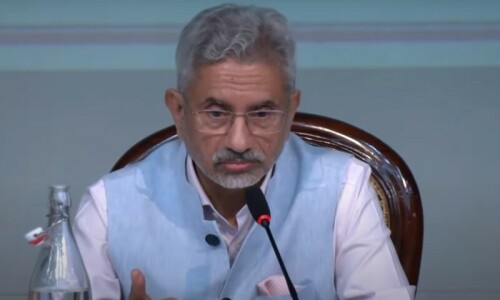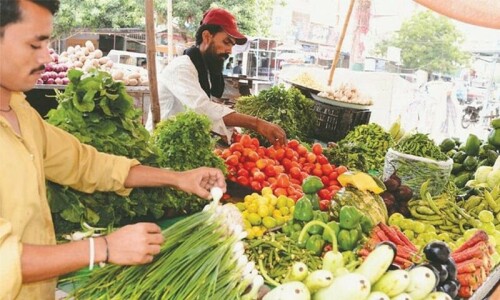KARACHI, Feb 9: Admitting that the Sindh government had been supplied substandard foreign wheat, provincial Minister for Food Nadir Ali Magsi said on Monday that his department had no choice but to accept the “useless” wheat, adding that he was the first to have written to the federal government about the poor quality of the staple crop.
He was replying to a supplementary question about why the Sindh government hadn’t rejected the substandard wheat during question hour in Monday’s Sindh Assembly session, as the affairs of the food department came under scrutiny.
Unlike question hour during the past few days of the current session, Monday’s question hour seemed almost breezy, as the legislators debated the answers given by the minister for a little over 30 minutes.
Written replies were furnished to eight questions sent to the food department by lawmakers, whereas in the past up to 40 questions had been sent to the respective departments, with the result that only a few questions could be debated before the house moved on to other business.
The question about the quality of imported wheat arose after Shamim Ara Panhwar’s query had been taken up. The Pakistan People’s Party lawmaker had asked the minister for the rate/quantity of wheat purchased by the Sindh government during the years 2004 and 2005.
Mr Magsi, in his written reply, stated that in 2004, the rate per 40kg of wheat was Rs350, while a total of 179,274 tons had been acquired. In 2005, the government had purchased 517,731 tons at Rs400 per 40kg.
The minister for food also said that the prices of wheat were fluctuating as the crop was not arriving from Punjab due to the ban on inter-provincial movement of wheat.
He was replying to a supplementary question that stemmed from Farheen Mughal’s query, who had asked if the government had fixed the selling price of wheat in Hyderabad District during the current year as there was a shortage and prices had become very high.
‘No shortage of wheat’
In his written reply, Nadir Magsi said that the government has fixed the issue price of wheat at Rs750 for 40kg and Rs1,875 for 100kg without bag during the current fiscal year. “The government has not enhanced/increased the issue price of wheat during the year 2008. However, the (price) of wheat in the open market is fluctuating owing to supply and demand, but there is no shortage of wheat in the region.”
In reply to the supplementary questions, Mr Magsi said that the Punjab government had been repeatedly approached regarding the restrictions on inter-provincial movement of wheat. He said by the 15th of the current month, 47,000 metric tons of wheat would be left with Sindh. The Sindh government had asked the Punjab administration for 100,000 tons of indigenous wheat, but in return Punjab only promised 20,000 tons which, the food minister said, was too little.
In reply to another question Nadir Magsi said the market dries up before the new wheat crop is lifted, while the closure of the provincial border between Sindh and Punjab drove up the prices. “The prime minister has said that the ban should be lifted. However, it has not been implemented” by the Punjab government.
He said that Sindh’s requirement was 4.5 million tons of wheat, while the expected yield of the crop this year was 3.5 million tons. Punjab was supposed to fill the shortfall, he added.
When the PPP’s Bachal Shah pointed out that foreign wheat lying at Gwadar port would cost too much to transfer to Sindh, the minister agreed, adding that he had taken up the issue with the federal government and asked to send wheat directly to Karachi.
Storage facilities
Earlier, the National People’s Party’s Arif Mustafa Jatoi had asked the food minister for the salient features of a scheme to build storage facilities for wheat based on the public-private partnership.
In his written reply Nadir Magsi stated that “this is an unapproved scheme with a cost of Rs2,000 million. An amount of Rs100 million has been allocated for the current financial year as capital component. Meetings with stakeholders including the Flour Mills Association, Sindh Abadgar Board and leading growers were held. But no workable idea for its implementation has so far been achieved.
“The Sindh Abadgar Board has been requested to visit the silos near Karachi and examine the feasibility of this project on public-private participation. The feasibility report is still awaited.”
When Arif Jatoi pressed the minister to explain “the basic idea” behind the project, Mr Magsi replied that it was to get the private sector involved in building godowns. “It is in its preliminary stage. Approximately eight to 10 parties have shown interest. There is nothing on paper. (The proposal) is with the finance department.”
When asked for the cost of the feasibility study, the minister said it was “not a single rupee” as the private sector would write the report.
In reply to another question, the minister for food said that the province had a storage capacity of 700,000 tons, while the target was 1.2 million tons. He said that not all the grain was covered and the public-private partnership project was being considered to solve the storage problem.
Hoarding
When Syeda Marvi Rashdi of the Pakistan Muslim League-Functional asked the food minister if it was a fact that huge stocks of rice were lying in private godowns in Karachi, Mr Magsi replied that the matter pertained to the federal government as the Pakistan Agriculture Supplies and Storage Corporation (Passco) deals with rice.
When Arif Jatoi asked why the Sindh government didn’t buy the rice damaged by rains a few months ago, the minister replied that it was decided that Passco would buy the rice as the Sindh government did not have the funds.
Shaharyar Mahar of the PML-Q asked Nadir Magsi if it was not the Sindh government’s duty to keep a check on private parties who might be indulging in hoarding. The minister replied that if hoarding was going on, the government would take action.
Mr Jatoi had also asked the minister for the quantity of wheat required by the department from the federal government along with its expected date and point of arrival up to the procurement season in April 2009.
Nadir Magsi replied that 115,000 tons was expected by the second week of February with the largest chunk – 70,000 tons – to be provided by the Trading Corporation of Pakistan.
When Arif Jatoi asked the minister if “we will go hungry” in case the expected wheat does not arrive, Nadir Magsi put his faith in Providence.
“We will not go hungry. God is great.”















































Dear visitor, the comments section is undergoing an overhaul and will return soon.